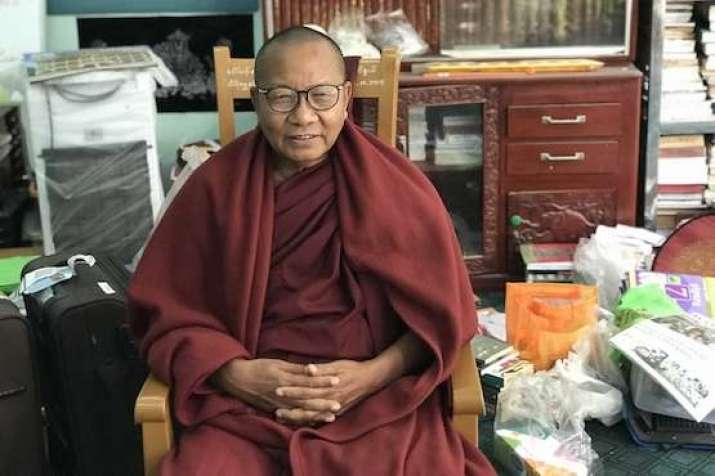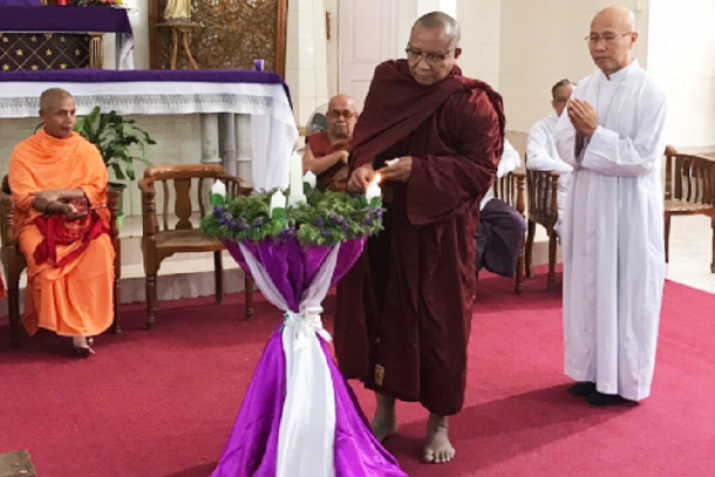
As interfaith and inter-communal hatred and violence continue to plague Myanmar, one Buddhist monk, Sayadaw Ashin Ariya Wun Tha Bhiwun Sa of Myawaddy Mingyi Monastery in Mandalay, is working with leaders of Christian, Hindu, and Muslim communities in the strife-torn Southeast Asian country, seeking to end the persecution of minority groups and the rise in nationalist extremism.
While the majority of people in Myanmar who have been targeted by militant nationalists in this Buddhist-majority nation are Rohingya Muslims, Hindu and even Buddhist villagers are also reported to have been victims of insurgent attacks, with thousands of people fleeing violence in the hope of finding safety in government-held areas, or crossing over the border into neighboring Bangladesh. The crisis has emerged as the biggest challenge facing Nobel Peace Prize laureate Suu Kyi, who is the de facto head of the country’s nominally civilian government, although the military still wields significant influence in state policy.
“We, the religious leaders, need to play a greater role in promoting harmony among the various religions instead of sowing hatred against minorities,” said the monk, better known as Myawaddy Sayadaw, acknowledging the vital role played by religious leaders in working toward a more peaceful society. “We are fighting for the truth and will challenge nationalist monks openly so that their voices are not louder and the tone of nationalism is decreased.” (UCANews)
Religious tensions between Buddhists and Muslims have simmered in Myanmar for almost half a century, but came to a head with violent clashes in 2012 that killed more than 100 people. Rakhine State is one of the most sensitive and conflict-prone regions in Myanmar, particularly since outbreaks of anti-Muslim violence in 2012 and 2013, following which some 140,000 people, most of them Rohingya Muslims, were displaced. Most Rohingya remain in squalid resettlement camps where they are subject to severe restrictions, with limited access to education, healthcare, or employment opportunities, although deadly outbreaks of violence and military action saw hundreds of thousands of Rohingya flee to neighboring Bangladesh in 2017 and 2018.
Myawaddy Sayadaw emphasized that Buddhist monks need to provide guidance for the people with regard to right and wrong, and to be more vocal in publicly criticizing Buddhist monks and others who spread anti-Muslim sentiment.
“The role of Buddhist monks is now important as the country is in a transition to democracy,” he said. “Silence is like supporting [misbehavior], so we raise our voices. Open criticism of monks does not mean a divided community—it is an effort to maintain Theravada Buddhism.” (UCANews)
Myanmar has seen a steady increase in nationalist sentiment, bolstered by growth in a number of ultra-nationalist religious organizations such as the Committee for the Protection of Nationality and Religion (Ma Ba Tha), a collective of hardline Buddhist abbots and influential monks founded in 2013 that has actively fueled religious division in Myanmar and encouraged violence—especially toward the Rohingya minority. However, major figures from Myanmar’s mainstream political and religious communities, including the State Sangha Maha Nayaka Committee of the country’s most senior monks, have publicly spoken out against Ma Ba Tha, saying the group is not representative of the country’s Buddhist sangha and does not reflect the essence of Buddhism.
After being forced to disband in 2017 by the State Sangha, the grouping of nationalist monks reorganized under the name the Buddha Dhamma Philanthropy Foundation.

Myawaddy Sayadaw has openly criticized nationalist sentiment and the prominent monastics behind the Ma Ba Tha movement, decrying them for tarnishing the image of Theravada Buddhism and the monastic sangha in Myanmar and internationally.
“They [nationalists] do not represent the 89 per cent of Myanmar’s Buddhist population, but their voices are louder than those most monks who stay calm and choose not to speak out against them,” said Myawaddy Sayadaw. “Actually they are so-called nationalists, backed up by political opportunists who want to gain power.” (UCANews)
Myawaddy Sayadaw has actively taken part in interfaith activities across the country, collaborating with other supporters of peace and human rights, including Cardinal Charles Maung Bo in the former capital Yangon. He was also among Buddhist leaders who joined a November 2017 interfaith meeting with Pope Francis in Yangon.*
Myawaddy Sayadaw’s stance has also been echoed by the secular authorities. Earlier this year, Myanmar’s Ministry of Religions and Culture decried monastics who fail to adhere to their vows and sangha rule, describing them as undeserving of the respectful honorific sayadaw (senior monk).
“Those [monks] involved in affairs not related to religion are causing confusion and tarnishing the image of Buddhism,” the ministry said in a statement in June, describing their actions as undermining the country’s stability.
Despite continued concern that anti-Muslim sentiment could be fanned by nationalist fringe groups in the run-up to the national election scheduled for next year, Myawaddy Sayadaw remains unfazed in his opposition and confident of the country’s path toward peace.
“They [nationalists] might have an agenda for the 2020 election, but I have no fear and will continue to fight for it,” the monk said. “I will not give up my fight against the nationalist movement and their rhetoric against Muslims because it goes against the way of Buddha.” (UCANews)
“They don’t have a clear agenda—they are acting as they are told to do. Their role is now diminishing,” the monk added. (UCANews)
Myanmar is a predominantly Theravada Buddhist country, with 88 per cent of the population of 51.5 million people identifying as Buddhists, according to census data for 2014. Christians, folk religions, and Muslims make up the bulk of the remainder. Buddhist monks, venerated throughout Burmese society, are estimated to number in excess of 500,000, with some 75,000 nuns in the Southeast Asian country.
* Pope Francis Calls for Human Rights, Justice, and Respect in Myanmar, Avoids the Term “Rohingya” (Buddhistdoor Global)
See more
The monk fighting a tide of hatred in Myanmar (UCANews)
Buddhist body urged to discipline Myanmar’s unruly monks (UCANews)
Wayward monks censured by Myanmar (UCANews)












